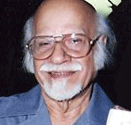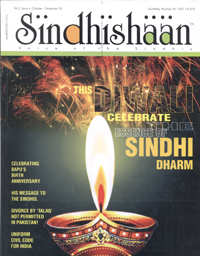Black Diwali
Kanwar - The Soul of Sindhi Music
By Kirat Babani

Sindh is the land of the blessed, abounded by a galaxy of great saints, sages and savants, where the Vedas were chanted on the banks of its sacred river Sindhu. Many of the saintly beings born on this sacred soil have reached the pinnacles of spiritual glory and cast a beneficial and abiding influence on the lives of the vast masses of the people of Sindh. The shining star among the cluster of such men of higher wisdom and supreme knowledge was popularly known as ‘Bhagat’ Kanwarram, a legendary singing minstrel of Sindh.
At an early age, the young boy assisted his father, attending cultivated fields and also sitting at the Kiryana (grocery) shop in the village. In addition, he often added to the income of the family by selling boiled grams, carrying a pot on his head and going in the streets of the village, in the evenings. Like a true vendor, he used to call out his wares loudly, but in such a sweet and sonorous voice that passers by or the people sitting in their homes would come out to buy the spicy and tasty grams.
Kanwar passed his early years in a simple and affectionate environment. He grew in age. But the promise made to the Rabarki Darbar had to be kept and honoured, as an article of faith. When he reached the age of twelve, he was given over to saint Satramdas, the spiritual head of the Darbar, who took him as his true disciple. Young Kanwar accepted the Saint at his true Guru (spiritual guide) and remained fully devoted and wholly dedicated to the Darbar and his spiritual mentor. He absorbed himself completely in the service of the shrine. He took his first lessons at the feet of his master, Guru Satramdas. He also took to singing kirtan and his interest in music deepened.
Kanwarram took his formal education in a Mandir. He was sent to Hayat Pitafi, a nearby village, for that purpose, where he learnt the Gurmukhi alphabet and delved deep into the Sikh religious scriptures the Jap Sahib, Sukhmani, Guru Granth Sahib, etc. He extended his knowledge of other saintly people also, by reading the biographies of saints like Kabir, Farid, Tulsidas, Ravidas and studied the poetic works of the great Sufi poets of Sindh such as Shah Latif, Sachal Sarmast, Sami, Rohal, Dalpat and others.
As time went by, music entered his soul. He became the embodiment of Sindhi music. He reached the Zenith of his popularity as a singer and toured the whole of Sindh with his singing party, pouring music in the hearts of the masses as well as the classes. He came to be acknowledged as the greatest or the supreme among the Bhagats (folk singers) of Sindh.
Bhagat is a particular form of folk singing. It is a harmonious blending of song, dance, storytelling and a bit of dramatics. It is a popular ageold form of mass entertainment for community gatherings, festivals, celebrations of important events and occasions. It developed through the years and its origin can be traced to the ancient bards, who wandered through the countryside singing and narrating old heroic and dramatic ballads of warriors and lovers of bygone times. This developed into a popular form of cultural entertainment.
The show starts late in the evening, when the village or town people have taken their evening meals and are ready to sit throughout the night, till the wee hours of the next morning. Men, women and children partake the bewitching pleasure of the performance. The Bhagat, with his melodious voice, the rhythm of his delicate steps and body movements, and enchanting effect of storytelling, dramatises the story telling, enchanting the audience, which by now, is glued to their seats. He has the ability of modulating his rich voice to create different moods, be it pathos, agony, despair, humour, glory, tragedy, as is required by the story. He moves the hearts of his listeners, bringing them to guffaws or tears as the situation may demand. Bhagat Kanwarram brought this art form to the climax of its glory.
He was a wandering saint, who travelled the whole of Sindh like a Charan (a singing ministrel). He visited even the smallest of the villages, spreading his message of goodwill, love and brotherhood. On hearing about his programme, people from neighbouring villages would come by the cartload or on camel or horseback even by foot, walking miles upon miles just to catch a glimpse of the saint and listen to his alluring voice.
He was a legendary figure. It is said of him that in his music gatherings, he would collect money from his appreciative listeners by spreading his jboli (a piece of cloth, which he put round his neck). People responded generously. And the legend goes that the money thus collected was distributed by the saint there and then, among the poor the lame, the blind, the crippled and the needy, who would swarm the place, wherever his programme was held.
Bhagat Kanwarram was a person of rare qualities simple, honest, straightforward, with a spotless character, dedicated to the service of mankind, imbued with virtues of patience, goodness tolerance and forgiveness. He was a highly realised soul, a man of spiritual pursuits. In his lifetime, he received lakhs of rupees in appreciation of his piety and service to the Sindhi people, through his soulful, and sublime music. About his noble, big heart, a story is told. An old Muslim of 107 years of age, had a yearning to have the darshan of Bhagat Kanwarram in his lifetime. Due to his old age and infirm physique, he could hardly travel to any of the places where Bhagat Kanwar performed. In his innocence, the old Muslim sent a message to the saint making a humble request that if by any chance, the Bhagat passed by his village, he (the old man), was keen to have his darshan. The saint, in his utter modesty, answered the wish of this dedicated devotee and paid an unscheduled visit to the village. Such was the greatness of the saint of Sindh Bhagat Kanwarram.
For the noble cause of communal harmony, even the British Government of the day, recognised his services and felicitated him in a formal way by giving him a citation and offering him a Dushala and a coconut. It was an unprecedented distinction conferred on him in appreciation of his service to communal amity.
And what a terrible tragedy! Such a pure soul an apostle of Hindu–Muslim unity, became the victim of an assassin’s bullet. On that fateful day of his worldly journey, Bhagat had his programme, called manjband in the town, where it is said he sang Sur Maroo (the song of death). While singing the mournful tune, streams of tears flowed from his eyes. The people wept and cried. It is said, after the song session, he had uttered the following words to his disciples: “Kirtan time is over and my time is also over”. On the way, he reached Ruk station for a change over. At the Ruk station two gunmen approached him and asked him to bless them. He gave them prasad and wished them success in their mission. The murderers, feigning their innocence, touched his feet and went away. He entered the train and sat by the side of the window. When the train started, gunshots were heard. The bullets had pierced his forehead. He did not utter a single word. He fell down, blood oozing from his wounds. A shock wave went through the town of Ruk. He was rushed to the city of Sukkur for medical help, but it was too late. He breathed his last before reaching his destination.
The news of the assassination of one of the greatest sons of Sindh, spread like wildfire. The whole of the province fell into deep sorrow and lamentation. People broke into sobs, weeping and crying bitterly. Even the doctor who operated on the body of the saint to take out the bullets, broke down and cried like a child in front of the nurses and other doctors. Hindus... and Muslims joined together to console each other at this irreparable loss.
People from all over the province joined the funeral procession. A sea of humanity followed Kanwar on his last journey at his village Daharki. There was a total bandh (curfew) in the whole province, as a mark of homage to the departed soul of the greatest singer Sindh ever produced. Kanwar died on the night of 31st October (1st November, 1939), a few days before the Festival of Diwali. During that Diwali there were no lights - a dark and mournful Diwali!


